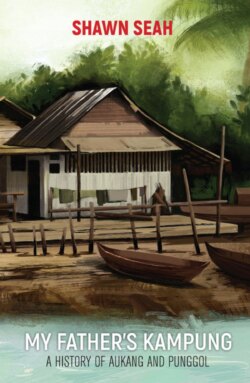Читать книгу My Father's Kampung - Shawn Seah - Страница 11
На сайте Литреса книга снята с продажи.
The Teochew
ОглавлениеMy father once told me that the Teochew people are highly refined. Instead of using crass terms, a Teochew answering the call of nature will describe the activity as a poetic reference to nature itself:
Huang lai, whole lai,
Keng chio ka lup
Sa si kai
The three key terms are: huang (wind), whole (rain), and keng chio (bananas). Lai means to come, ka lup means to drop, and sa si means three or four. Putting them altogether, the description reads:
When the wind and rain come,
The bananas drop
In threes and fours
Doesn’t this poem express beautifully not only the call of nature but also the sequence in which it is answered?
Now, who makes a better bride, a Teochew or a non-Teochew Chinese?
A full-blooded Teochew lady will be totally convinced that a Teochew girl makes the best bride. Her belief may be encapsulated in a catchphrase: Yu pi, yu chi.
Translated into English, this can be interpreted as “Not only cheap, but also fresh”. This phrase is normally what a fishmonger would say to entice customers to buy his fish.
However, used in the context of the desirability of marrying a Teochew girl, it means she is “good value for money”, or, more literally, “not only cheap but good”—a less complimentary remark.
A Teochew bride is beautiful, loving, faithful, and cooks well. And, most important of all, her parents will not demand many wedding dinner tables from the in-laws! So, it is wise to marry a Teochew lass!
Finally, Teochews often refer to each other as ka kee nang (our own people). This refrain is repeated, by Teochew to Teochew, and sometimes in full:
Teochew nang, ka kee nang
I began a book on Aukang by telling you about the Teochews because my father is a ka kee nang, and he is proud of it.
